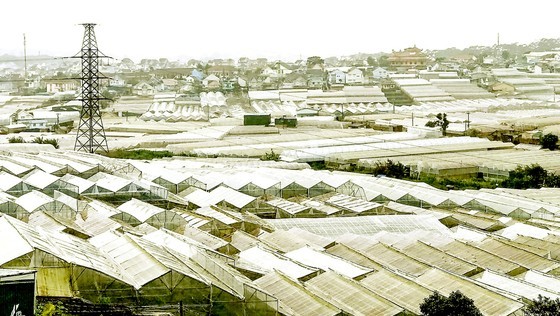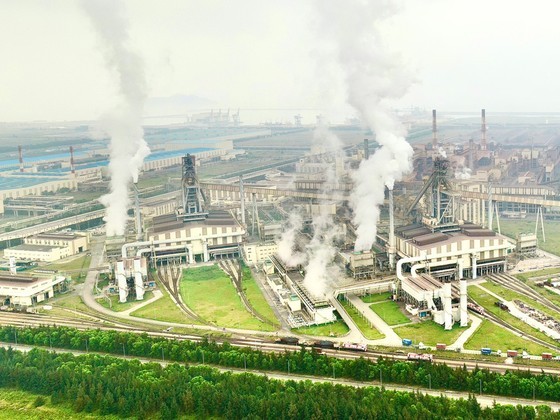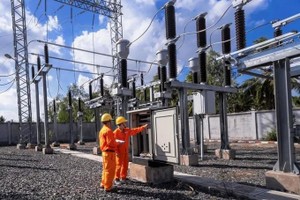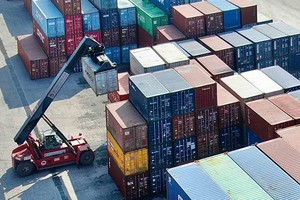 |
The development of greenhouses and net houses in Da Lat without proper control has affected the landscape and environment. (Photo: SGGP) |
Institutional setting
In two years' time, Europe will implement a carbon tax on imports, starting with steel, cement, fertilizer, iron, aluminum, and electrical appliances. Furthermore, European investors will be required to report on the climate impact of their investments abroad. These measures will undoubtedly have an impact on businesses in any country that conducts business with Europe. Currently, Canada, the US, China, and many other countries have implemented ETS activities. Therefore, Vietnamese companies must be aware of and actively participate in this market, regardless of their preferences.
Vietnam has made significant strides toward establishing a domestic carbon market in recent years. The Law on Environmental Protection 2020, which came into effect on January 1, 2022, represents a significant milestone in this regard. This law outlines the basic principles for organizing and implementing a carbon market in the country. Additionally, in 2021, the Government's Resolution No.50-NQ/CP identified the development of a carbon market in Vietnam as a crucial task in responding to climate change and protecting the environment.
Especially, Decree No.06/2022/ND-CP, dated January 7, 2022, outlines specific timelines for reducing greenhouse gas emissions, protecting the ozone layer, and developing the carbon market in Vietnam. According to this decree, a pilot operation of a carbon credit exchange will be established and organized in 2025. By the end of 2027, regulations will be developed for managing carbon credits and greenhouse gas emission quotas, and carbon credit exchanges. Additionally, regulations for operating carbon credit trading floors will be developed, and the mechanism for exchanging and clearing carbon credits in potential areas will be piloted. Furthermore, guidance will be provided for the implementation of the domestic and international carbon credit exchange and clearing mechanisms. Starting from 2028, Vietnam will officially operate a carbon credit exchange and regulate activities to connect and exchange domestic carbon credits with regional and global carbon markets.
Supporting business transformation
The formation of a domestic carbon market provides a platform for businesses to effectively reduce their carbon emissions and increase their compatibility with international carbon pricing mechanisms. Furthermore, it creates opportunities to link up with carbon markets in the world and the region, while also increasing the competitiveness of Vietnamese products in the international market. The carbon market can also act as a resource generation mechanism, promoting the development and application of low-emission technologies, aiming at a carbon-neutral economy.
Mr. Pham Van Tan, Deputy Director of the Department of Climate Change under the Ministry of Natural Resources and Environment, commented that the legal regulations related to the organization and development of the carbon market in Vietnam are quite comprehensive. The involvement of governments at all levels in supporting businesses to prepare for participation in the carbon market is extremely important as it acts as a driving force for accelerating enterprises to participate in this market.
For enterprises, the first step is to prepare qualified personnel to carry out the greenhouse gas inventory and develop a plan to reduce greenhouse gas emissions. To participate in this transition, businesses, especially those operating in energy-intensive industries and fields that emit a lot of greenhouse gases, such as iron, steel, cement, and aluminum production, should strengthen their cooperation with government agencies to develop and implement measures to reduce emissions and enhance activities that absorb greenhouse gases, such as changing technology and planting trees. They should also form a system of standards and emission factors for their business products.
 |
Smoke from plants in Vung Ang Economic Zone in Ha Tinh Province. (Photo: SGGP) |
Enterprises can play an active role in the carbon market. According to Mr. Pham Van Tan, in a mandatory carbon market, the government sets a common emission cap for the country and then allocates it to each market participant. Establishments must adhere to the quotas granted by investing in emission reduction measures or purchasing quotas from other establishments or carbon credits through the carbon market. Failure to comply may result in fines for each ton of carbon dioxide equivalent emissions exceeding the quota. As per the national overall emission reduction roadmap, the quota allocated to facilities will gradually decrease over time.
The voluntary carbon market is primarily based on the carbon offsetting needs of organizations and individuals who voluntarily wish to reduce their carbon footprint. Commodities traded in this market are carbon credits generated from programs and projects that reduce greenhouse gas emissions and follow internationally or nationally recognized methodologies.
Buyers in the voluntary carbon market are usually businesses, organizations, or individuals looking to demonstrate social responsibility and promote sustainable development. By purchasing these credits, they contribute to activities that reduce greenhouse gas emissions, mitigate the impact of climate change, and help achieve the goal of limiting the Earth's temperature rise to no more than 1.5 degrees Celsius above pre-industrial levels.
* Buying carbon credits does not mean emitting greenhouse gases freely
Dr. Truong An Ha, a carbon pricing expert from the Vietnam Initiative for Energy Transition, has highlighted that in some countries, businesses are not allowed to use carbon credits purchased from the voluntary market to make up for their excess greenhouse gas emissions on the mandatory market.
For instance, the European Emissions Trading System (ETS) quota exchange market permitted the use of credits from the Clean Development Mechanism or Joint Implementation Mechanism for quota compliance during 2008-2020. However, the excess supply of credits led to a sharp drop in their selling price, which in turn affected the motivation of enterprises to invest in emission reduction technology. Therefore, the EU has removed this regulation in phase 4 of the market (2021-2030), meaning that enterprises can still purchase carbon credits to contribute to the overall emission reduction target, but they cannot use them to offset their emissions quotas.
According to Article 19 of Decree No.06/2022/ND-CP in Vietnam, establishments can use carbon credits from projects under carbon credit exchange and clearing mechanisms to make up for their excess greenhouse gas emissions. However, the credits cannot exceed 10 percent of the total allocated quota. Vietnam has set emissions reduction targets in its Nationally Determined Contribution (NDC) and aims for net zero emissions by 2050, which have been submitted to the United Nations. These targets will form the basis for setting the national emission limit and allocating quotas to emission facilities in the future.
* Vietnam's forest carbon credits are worth millions of dollars
Vietnam has the potential to earn hundreds of millions of dollars annually by selling 57 million forest carbon credits to the world market at US$5 per credit (equivalent to 1 ton of carbon dioxide), according to the calculation of relevant authorities.
According to Assoc. Prof.-Dr. Pham Van Dien, Rector of Vietnam Forestry University, Vietnam has a vast potential to sell forest carbon credits on the market. Several international organizations, such as Emergent, SK, and Green Climate Fund (GCF), have launched programs to invest, broker, and trade in forest carbon credits.
To develop the forest carbon market, Vietnam should improve its legal framework and develop new Vietnamese carbon standards that align with internationally recognized standards. These standards will serve as a basis for measuring, monitoring, and appraising the amount of emissions reductions and absorption increases in the forestry sector. Additionally, localities, forest owners, and economic sectors should actively respond to the "Green Growth Forestry Program" and the "Glasgow Action Plan" that the Ministry of Agriculture and Rural Development has been directing to implement and replicate.
























